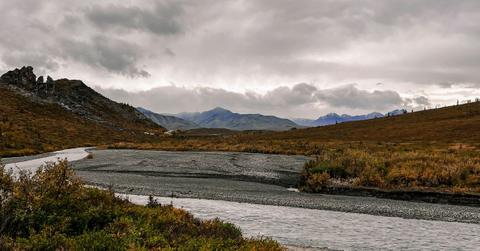Ancient Ecosystem ‘Crazy Rich With Dinosaur Footprints’ Found in Alaska

Scientists discovered an ecosystem filled with dinosaur tracks in Alaska, officials said.
In a groundbreaking discovery, scientists have discovered a treasure trove of dinosaur tracks and fossils dating back 100 million years, nestled within the foothills of a mountain range in Alaska.
Revealed beneath the De Long Mountains, within the Nanushuk Formation, this fossil site offers a tantalizing glimpse into a bustling Cretaceous-era ecosystem populated with dinosaurs of various sizes, as outlined in a statement from the University of Alaska Fairbanks recently.
Spanning the years 2015 to 2017, paleontologists meticulously explored the site, revealing a staggering 75 dinosaur tracks left behind by both carnivorous and herbivorous dinosaurs, though specific species remain unidentified.
Lead author Anthony Fiorillo, Executive Director of the New Mexico Museum of Natural History and Science, described the site as "crazy rich with dinosaur footprints."
Further exploration uncovered an impeccably preserved ancient landscape adorned with a myriad of fossils including 2-foot-wide tree stumps, leaves, tracks and even feces.
Fiorillo said it was like they were “walking through the woods of millions of years ago.”
These findings were documented in a study recently published in the journal Geosciences. Dating back to the Albian-Cenomanian Age of the Cretaceous period, approximately 94 to 113 million years ago, the Nanushuk Formation provided a glimpse into the diverse array of dinosaurs that once roamed the region.
Among the discoveries, bipedal ornithischians, representing 59% of the tracks, dominated the landscape. These herbivorous dinosaurs, including the iconic helmet-headed pachycephalosaurs, left a significant mark on the ancient terrain.
- Villagers in India Unearthed ‘Sacred Stones.’ Scientists Are Stunned by What the Finds Turned Out to Really Be.
- Massive Memorial Day Discovery: North Dakota Coal Miners Dig Up 7-Foot Mammoth Tusk
- Primitive Pictures: 2,000-Year-Old Rock Art Depicting Animals, Human Footprints and Stars Discovered in Brazil
Quadrupedal ornithischians, comprising 17% of the tracks, were also identified, with some belonging to the famed ceratopsians, such as the three-horned Triceratops.
Additionally, the site unveiled evidence of meat-eating dinosaurs, with 9% of the tracks attributed to carnivorous, nonavian theropods. Notably, tracks from Turonian theropods like Suskityrannus and Timurlengia, comparable in size to today's horse, were also discovered.
Never miss a story — sign up for the Front Page Detectives newsletter. Be on the scene the moment news breaks.
Remarkably, the fossil site wasn't solely inhabited by dinosaurs — approximately 15% of the tracks belonged to shorebirds, hinting at a vibrant ecosystem reminiscent of today's Arctic breeding grounds for numerous avian species.
Moreover, researchers utilized the formation to glean insights into the ancient Arctic's climate, revealing a warmer and wetter environment akin to modern-day South Florida. Through analysis of wood fragments, they estimated a mean annual precipitation resembling that of present-day Miami.
"The temperature was much warmer than it is today, and what's possibly more interesting is that it rained a lot," noted Fiorillo. "The samples we analyzed indicate it was roughly equivalent to modern-day Miami. That's pretty substantial."
Become a Front Page Detective
Sign up to receive breaking
Front Page Detectives
news and exclusive investigations.
